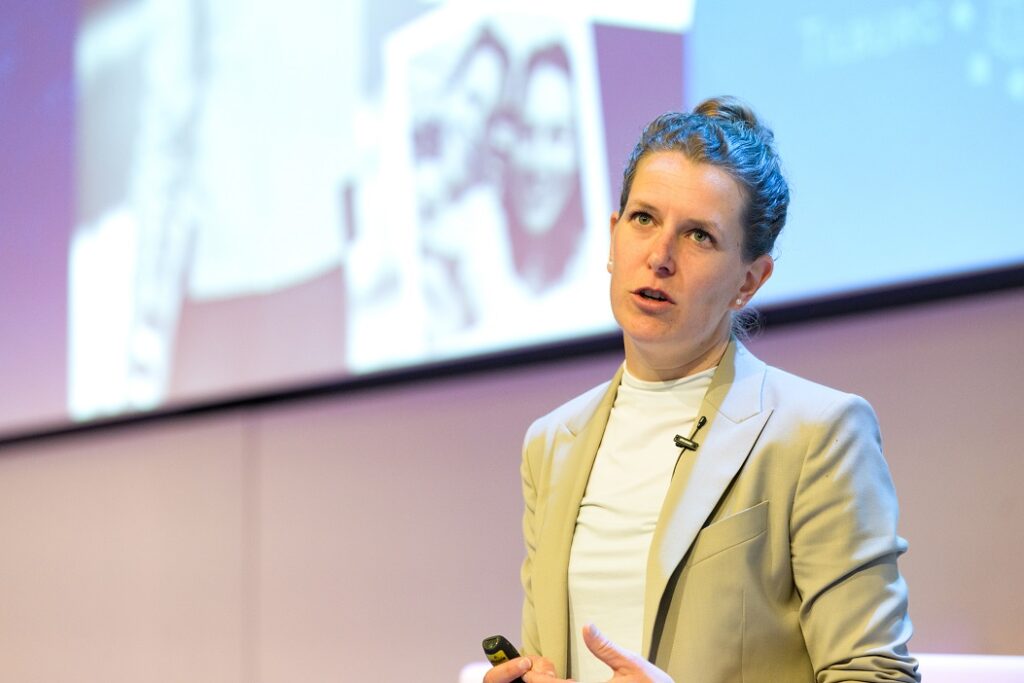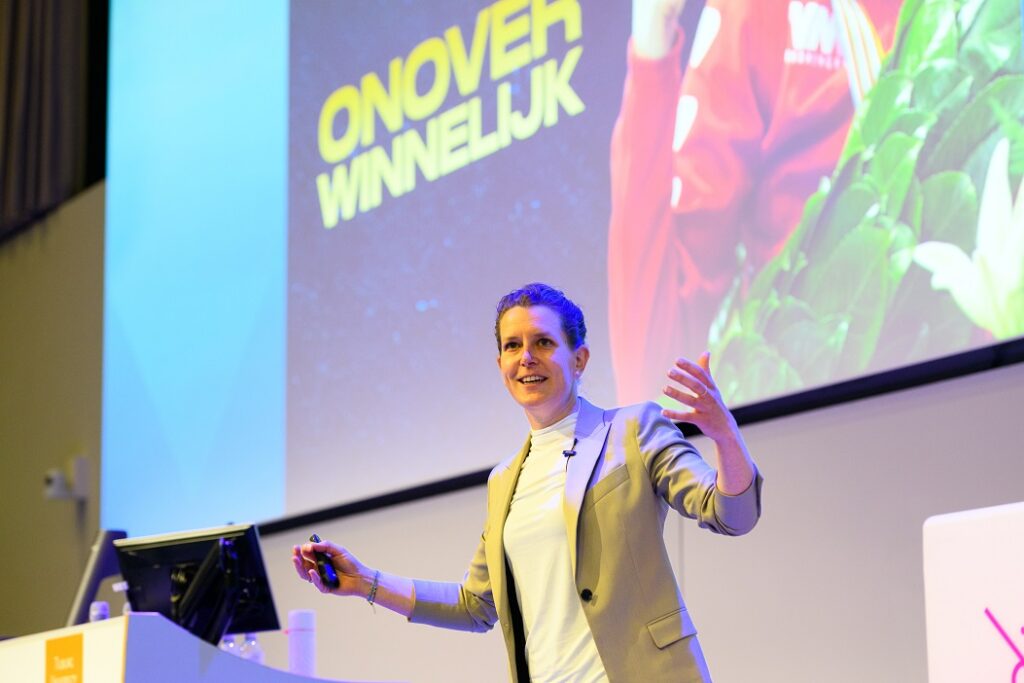Ireen Wüst: ‘You are not what you achieve’
Ireen Wüst, the most successful Dutch Olympian ever, discussed the highs but also the lows of her skating career during the Night University. Univers was there and spoke to Wüst after her guest lecture about performance pressure and motivation. ‘You have to keep asking yourself who you’re actually doing it for.’

With a compelling video summarizing her successful career, Ireen Wüst (1986) begins her guest lecture in Cube’s main hall. Her career played out at the very highest level for eighteen years. And that includes the necessary performance pressure, Wüst tells an attentively listening audience.
‘I always strived for perfection, and I can’t stand losing,’ she adds. If she wanted to fill up on self-confidence before a race, she used the ‘Wüst method’. ‘Then, beforehand, I paid very conscious attention to everything that went well. When I did my warming-up before a race, I thought with every good start: another few percent of self-confidence, with every good stroke: again more self-confidence. Until finally I stood at the start and had one hundred percent confidence.’
The room goes silent as Wüst recounts the passing of her best friend and neighbor Paulien van Deutekom. The skater died of lung cancer in 2019 at the age of 37. ‘This is the hardest thing I have experienced in my life,’ Wüst said with a straight face. ‘Paulien’s passing hurt so much. I broke down with grief.’ A month later, Wüst became world champion at the 1500 meters in Inzell. ‘I wanted to win for Paulien.’ She gave her medal to Van Deutekom’s daughter. ‘So she can look back on that later.’
After her guest lecture, Wüst took a seat in an empty Cube lecture hall to answer a few questions.

There is currently a lot of focus on the performance pressure some students feel. You know better than anyone what it’s like to perform under pressure for long periods of time. How did you deal with that?
‘By always asking myself for whom I was actually doing it. The biggest pressure always came from myself; the outside world didn’t matter to me. If I had had to carry that burden as well, I wouldn’t have made any progress.
‘That pressure from outside, you can’t live with that: if seventeen million Dutch people think you should win, and I had allowed that in my head, I would have suffered. I did the best I could, and then if it didn’t work out, I didn’t feel I had failed, but maybe I had learned an awful lot. So I kept it small, and especially very close to myself.’
There is more and more openness about mental problems in young people. This development is also going on in the top-level sports world.
‘Fortunately, yes, because it was really a taboo subject. In 2008, I became overtrained. That’s a physical problem, but also a mental issue. That’s why I decided to see a psychologist. But through the back door, when that practice was already closed, and the cleaners were busy. I was far too afraid that someone would recognize me in the waiting room, and that the next day the newspaper would say that Wüst was sick and visiting a psychologist.
‘So there was such a taboo regarding this. A few years later, when I was stronger and got rid of being overtrained, I talked about this in an interview. After that, more and more athletes opened up about their mental problems. We are unfortunately not yet at the point where people say, I’m going to the physical therapist and I’m going to do something about the mental aspect at the same time.
‘Look, at the Olympics everyone is physically well trained. But my belief is that the one who has things sorted out in his or her upper chamber is the one who is going to win. That’s why I think the mental aspect in top-level sports is hugely important. The psychologist taught me that you are not what you perform. You are much more than that. Apart from performing, it is, of course, also important that you remain comfortable in your own skin.’
When you perform at such a high level for so long, there are bound to be days when motivation and discipline are a little off. How did you make sure you regained focus?
‘You can’t burn the candle at both ends all the time, there has to be a good balance. As a skater, I knew I had to perform in the winter, so in the summer I could go to parties. Those became unforgettable nights with my whole group of friends. I would let go of everything, eat what I felt like, and then I would get really drunk. At those moments it was possible. By making sure I had that relaxation and release, I could be focused again afterwards.’
And the motivation?
‘Honestly, there weren’t many days when I wasn’t motivated. I was doing what I love most: skating and improving myself. Of course I hated it when it rained during a training session, and I had to ride my bike for three hours in the rain. I could really have done without that. Still, that had to happen, too.
‘Top-level sport means you make a commitment. It’s hard work and not just fun. But if you go back to the core and ask yourself if it still makes you happy, and the answer is ‘yes,’ then it’s easy to make sacrifices. Although I actually never experienced it as making sacrifices.’
After you got your VWO diploma you didn’t start studying, you went to the Olympics in Turin. Did you ever wonder what it would have been like to study?
‘No, because during time at the VWO you already have to make career choices at certain points. I agreed with my parents that I would first fully go for skating for three years after finishing my VWO to see if that would work out. I was already competing on the international circuit as a junior and had a race almost every weekend. For that reason, I took my exams in two years. If it hadn’t worked out with skating, I still would have started a study program.’
What study program had you wanted to do?
‘Probably psychomotor therapy or movement therapy. So a more practical study, not a university one.’
Translated by Language Center, Riet Bettonviel






